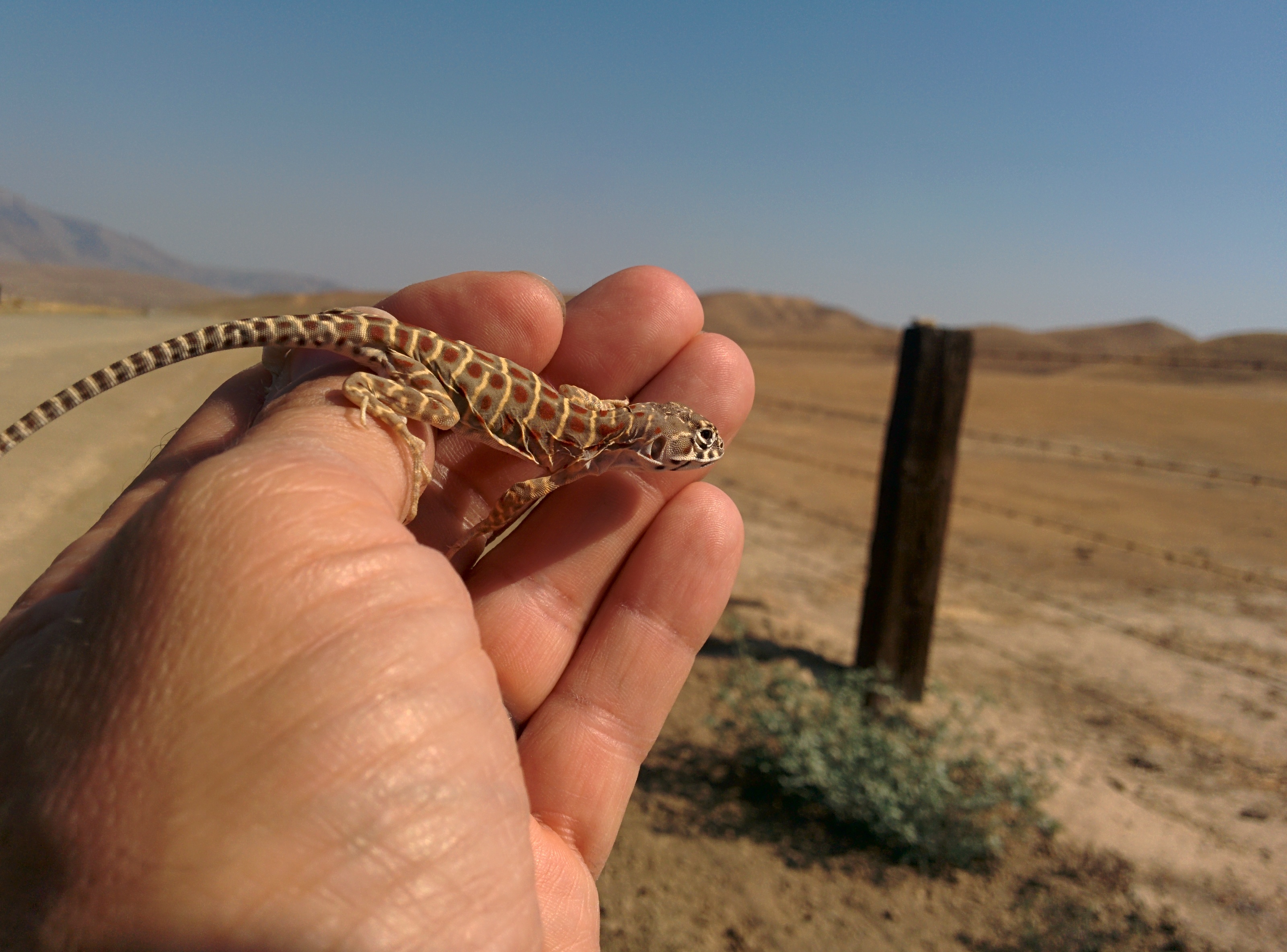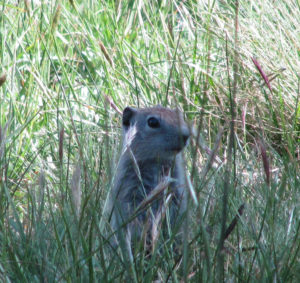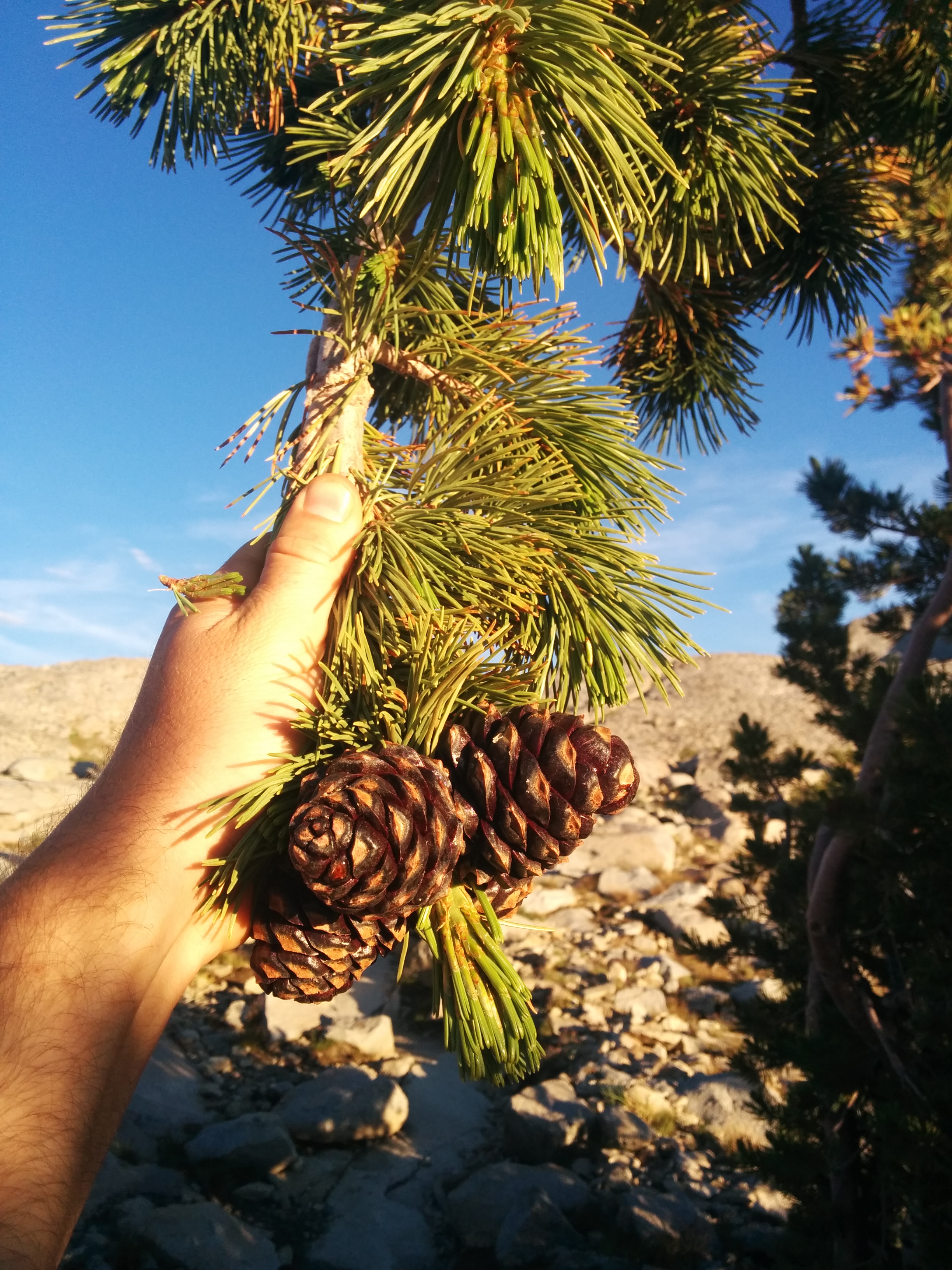Research Interests:
- Reforestation and Forest Management- Increased high severity fires and drought are leaving vast areas devoid of natural conifer regeneration. Where are forests regenerating on their own and where are they not? When managers opt for reforestation, where should seeds be sourced from to ensure they have the best chance of growing into healthy, resilient, and climate-adapted forests? Where can strategic fuel reduction lead to the largest gains in conserving forest habitat, resources, and natural heritage?
- Conservation Biogeography – Environmental changes are driving shifts in the geographic distribution of species. What management actions can we take to save disappearing wildlife?
Decision Support Tools:
- Climate Adapted Seed Tool (CAST) – Rapid climate change has caused a mismatch between the climate that tree populations have adapted to and the climate they currently grow in. This tool helps ecosystem managers identify seed sources that are pre-adapted to local climate conditions at their planting sites. CAST currently serves CA, OR, WA, ID, & NV, though some features are limited to California.
- Postfire Conifer Reforestation Planning Tool (PostCRPT) – Large and severe wildfires are leaving vast areas devoid of natural conifer regeneration. This tool aids managers in prioritizing areas for reforestation by providing maps of predicted natural conifer regeneration. It includes taxon-specific regeneration predictions and a range of postfire climate and seed production scenarios. This is a supplement to our paper on postfire conifer regeneration. PostCRPT currently serves low-moderate-elevation forests of California and Southern Oregon.
- Pika Extirpation Predicter – This is an interactive supplement to our paper on pika extirpations in California. Adjust the slider to see where American pika populations are predicted to become extinct as temperatures warm.
Peer-Reviewed Papers:
- Beever E.A., Smith A.B., Wright D.H., Stewart J.A.E., Rickman T., Klingler K.B. (2025) Expanding climate-induced barriers: Impassable gaps interior to distribution of an isolated mountain-dwelling species. Ecosphere, DOI:10.1002/ecs2.70223
- Looney C.E., Stewart J.AE., Wood, K.E.A. (2024) Mixed-provenance plantings and climatic transfer-distance affect the early growth of knobcone-monterey hybrid pine, a fire-resilient alternative for reforestation. New Forests, DOI:10.1007/s11056-023-09991-9.
- Brodie E.G., Stewart J.A.E., Winsemius S., Miller J.E.D., Latimer A.M., Safford H.D. (2023) Divergent effects of wildfire on climate-driven upslope advance in shade-tolerant versus shade-intolerant conifers. Ecological Applications, DOI: 10.1002/eap.2888
- Beever E.A., Wilkening J.L., Billman P.D., [and others, including Stewart J.A.E.] (2023) Geographic and taxonomic variation in adaptive capacity among mountain-dwelling small mammals: implications for conservation status and actions. Biological Conservation, 282, 109942.
- Klingler K.B., Nichols L.B., Hekkala E.R., Stewart J.A.E., Peacock. M.M. (2023) Life on the edge – a changing genetic landscape within an iconic American pika metapopulation over the last half century. PeerJ. 11, e15962.
- Stern M.A., Flint L.E., Flint A.L., Boynton R.M., Stewart J.A.E., Wright J.W., & Thorne J.H. (2022) Selecting the Optimal Fine-Scale Historical Climate Data for Assessing Current and Future Hydrological Conditions. Journal of Hydrometeorology, 23:293–308.
- Stewart J.A.E., van Mantgem, P.J., Young, D.J.N., Shive, K.L., Preisler, H.K., Das, A.J., Stephenson, N.L., Keeley, J.E., Safford, H.D., Wright, M.C., Welch, K.R. & Thorne, J.H. (2021) Effects of postfire climate and seed availability on postfire conifer regeneration. Ecological Applications, e2280.
- Stewart J.A.E., Butterfield H.S., Richmond J.Q., Germano D.J., Westphal M.F., Tennant E.N., & Sinervo B. (2019) Habitat restoration opportunities, climatic niche contraction, and conservation biogeography in California’s San Joaquin Desert. PLOS ONE, 14, e0210766.
- Smith A.B., Beever, E.A. [and others, including Stewart J.A.E.]. (2019) Alternatives to genetic affinity as a context for within-species response to climate. Nature Climate Change, 9, 787–794.
- Wright D. H., Stewart J.A.E. (2018) Within-talus temperatures are not limiting for pikas in the northern Sierra Nevada , California , USA. California Fish and Game, 104, 180-195
- Aburto-Oropeza O., Johnson A.F., Agha M., [and others, including Stewart J.A.E.]. (2018) Harnessing cross-border resources to confront climate change. Environmental Science and Policy, 87, 128-132.
- Stewart J.A.E., Wright D.H., & Heckman K. (2017) Apparent climate-mediated loss and fragmentation of core habitat of the American pika in the northern Sierra Nevada, California, USA. PLOS ONE, 12, e0181834.
- Westphal M.F., Stewart J.A.E., Tennant E.N., Butterfield H.S., & Sinervo B. (2016) Contemporary drought and future effects of climate change on the endangered blunt-nosed leopard lizard, Gambelia sila. PLOS ONE, 11, e0154838.
- Stewart J.A.E., Perrine J.D., Nichols L.B., Thorne J.H., Millar C.I., Goehring K.E., Massing C.P., & Wright D.H. (2015) Revisiting the past to foretell the future: summer temperature and habitat area predict pika extirpations in California. Journal of Biogeography, 42, 880–890.
- Appendix S3: Animation of projected future fate of pika at 67 sites in California, USA.
- Interactive version of Appendix S3. Move the slider to adjust summer temperature.
- Stewart J.A.E. & Wright D.H. (2012) Assessing persistence of the American pika at historic localities in California’s northern Sierra Nevada. Wildlife Society Bulletin, 36, 759–764.
Technical Reports and Book Chapters:
- Stewart J.A.E., Long J.W. (2024) Distribution and Apparent Decline of Aspen (Populus tremuloides) in the Broader Lake Tahoe Area: A Four-Decade Assessment. Tahoe Science Advisory Council (TSAC), Incline Village, NV. 10.5281/zenodo.13948510
- Young-Hart L., Stine P., Manley P., Clark C., Bistritz L., Goulden M., Kuskulis E., Ramirez C., Slaton M., Stewart J.A.E., Tarnay L., Young, D.J. (2022) ACCEL Metric Dictionary Version 3.0. USDA Forest Service.
- Bean W.T, Stewart, J.A.E., O’Dell R.E., Phillips , S. (2021) Assessing Species’ Responses to Climate Change to Guide When, Where, and How to Rewild Retired Farmland. in Butterfield H.S., Kelsey T.R., Hart A.K.(editors). Rewilding Agricultural Landscapes: A California Study in Rebalancing the Needs of People and Nature. Island Press.
- Stewart J.A.E., Anderson S., Nguyen C., & Wright D.H. (2017) High-elevation species and natural communities in the northern Sierra Nevada, final report: State Wildlife Grant F14AF00632. California Department of Fish and Wildlife, Sacramento, CA.
- Sinervo B, Lara Reséndiz R.A., Miles, D.B., [and others, including Stewart J.A.E.] (2017) Climate change and collapsing thermal niches of Mexican endemic reptiles. UC Office of the President: UC-Mexico Initiative.
- Stewart J.A.E., Thorne J.H., Gogol-Prokurat M., & Osborn S.D. (2016) A climate change vulnerability assessment for twenty California mammal taxa. Information Center for the Environment, University of California, Davis, CA.
- Thorne J.H., Boynton R.M., Holguin A.J., Stewart J.A.E., & Bjorkman J. (2016) A climate change vulnerability assessment for California’s terrestrial vegetation. California Department of Fish and Wildlife, Sacramento, CA.
- Wright D.H., Furnas B.J., Anderson S., Stewart J.A.E., Nguyen C., & Callas R. (2015) Ecoregional biodiversity monitoring for change over large spatial scales, final report: State Wildlife Grant F12AF00829. California Department of Fish and Wildlife, Sacramento, CA.
- Stewart J.A.E. (2013) Distribution and abundance of pikas in the greater Yosemite ecoregion: final report. George Melendez Wright Climate Change Fellowship Program, Hancock, MI.

Selected Media Coverage:
- Plant back better, Mike Bialousz, Arc User. Feb 2022.
- Wildfire recovery aided with planting model, Susan Cosier, Scientific American. 1 April 2021.
- Idled farmland presents habitat restoration opportunities in San Joaquin Desert, Tim Stephens, UCSC News Center. 13 January 2021.
- What doesn’t work for crops may work for endangered lizards, Dana Kobilinsky, The Wildlife Society. 30 January 2019.
- American Pika Clinging to Existence in Tahoe, Greyson Howard, Tahoe Quarterly, 2018
- North of Lake Tahoe, the pika has gone locally extinct, Diana Madson, Yale Climate Connections. 26 January 2018.
- Rabbit Relatives Reel from Climate Change, Christopher Intagliata, Scientific American’s 60-Second Science. 2 September 2017.
- Gone from Tahoe: the American Pika, Eve Quesnel, Moonshine Ink. 14 March 2019.
- Years of Living Dangerously, Season 2, Episode 6. National Geographic Channel. 30 November 2016.
- Vanishing wildlife on a warming planet. Stewart J.A.E. Special for USA Today. September 2016.
- Drought helps predict how climate change might affect an endangered species. Tim Stephens, UCSC Newscenter. 4 May 2016.
- Climate change pushes pikas from traditional sites in the Sierra. Edward Ortiz, Sacramento Bee. 14 February 2015.
- MoveShake video profiling ASC’s Greg Treinish, and featuring yours truly. Alexandria Bombach, Red Reel. 2013.
- Counting Climate-Challenged Pikas. Quest. QKED. 28 September 2012.
Invited Seminars:
- van Mantgem P.J., Stewart J.A.E., Wright M.C. (2021) Rebuilding Forests After Fire. Southwest Climate Adaptation Science Center Webinar Series. University of Arizona, Tucson, AZ.
- Stewart J.A.E. (2018) Conserving wildlife in a changing world. Sierra Science Lecture Series, Sierra College, Grass Valley, CA.
- Stewart J.A.E. (2016) Methods for assessing vulnerability of species to climate change. National Institute of Ecology, Seocheon, South Korea.
- Stewart J.A.E. (2014) On the distribution and abundance of pikas in Yosemite. Yosemite Forum, Yosemite Valley, CA.
Selected Presentations:
- Stewart J.A.E. & Zhao Y. (2025) Climate-Adapted and Low-Risk Seed Selection. Spring 2025 UCOP Seed Project Stakeholder Meeting. Merced, CA.
- Stewart J.A.E. (2025) Evidence-based tools for improved reforestation outcomes. 2025 Planscape and American Forests Reforestation Summit. San Francisco, CA.
- Stewart J.A.E., Long J.L. (2024) Automated Spatiotemporal Tracking of Priority Overstory Hardwood Stands in the Tahoe Basin. Quarterly Meeting of the Tahoe Science Advisory Council. Virtual.
- Stewart J.A.E., Young D.J.N. (2024) Evidence-Based Tools for Improved Reforestation Outcomes. Quarterly Meeting of the California Climate Hub. Virtual.
- Stewart J.A.E., Wright J.W., Zhao Y., O’Neill G.A., Moran E.V., Thorne J.H., Boynton R.M. (2024) Climate Adapted Seed Tool (CAST): Planting for the Future with Climate-Adapted Seeds. Sierra Nevada Science Symposium, Merced, CA.
- Smith C.J., Stewart J.A.E., Shoemaker K.T. Silent Peaks: Widespread Progressive Extirpation of American Pika Populations in the Northern Sierra. Sierra Nevada Science Symposium, Merced, CA.
- Stewart J.A.E. (2023) Thirty-year trends in postfire conifer regeneration in California and western Oregon. 10th International Fire Ecology and Management Congress. Monterey, CA.
- Stewart J.A.E. (2022). The Climate-Adapted Seed Tool: Using Provenance Tests to Inform Oak Seed Transfer in a Changing Climate. 8th California Oak Symposium. San Luis Obispo, CA.
- Stewart J.A.E. (2022). Adapting Forests to Climate Change via Climate-Adapted Seed Transfer. The 10th Biennial UCSC Plant Science Symposium. Santa Cruz, CA.
- Stewart J.A.E. (2021) Optimizing Assisted Gene Flow for Forests. Introduction, Breeding, Propagation and Deployment of Pacific Northwest Conifers Around the World: 70 years of Progress, Opportunities, and Challenges. Virtual.
- Stewart J.A.E. (2019) Climate and seed availability drive postfire conifer regeneration: scenario planning for the 21st century. Climate Change and the Ecology of Sierra Nevada Forests, Merced, CA.
- Stewart J.A.E. & D.H. Wright. (2017) Invited Presentation. Geographically representative surveys of whitebark pine occurrence and stand characteristics in the northern Sierra with implications for vulnerability to climate change. Field-based Studies on Whitebark Pine in California – A Data Sharing Session, Parsons Lodge, Yosemite National Park, CA.
- Stewart J.A.E. & H.S. Butterfield. (2017) Invited Presentation. Habitat restoration opportunities for endangered species of the San Joaquin Desert. San Joaquin Desert Strategic Fallowing Workshop, National Center for Ecological Analysis and Synthesis, Santa Barbara, CA.
- Stewart J.A.E. (2016) Invited Presentation. Descent to the underworld: climate change opens gap in distribution of American pika in the Sierra Nevada, USA. Mathias Symposium, Bodega Bay, CA.
- Stewart J.A.E. (2016) On the vulnerability of biodiversity to climate change. Science on Tap, a monthly lecture organized by UCSC Women in Science and Engineering, Santa Cruz, CA.
- Stewart J.A.E., B. Sinervo, M.F. Westphal, H.S. Butterfield, & E. Tennant. (2015) Interaction of exotic grasses and climate drives contraction of blunt-nosed leopard lizard range at the northern range margin. Thirteenth Annual Species Interaction Workshop, Stanford University, Stanford, CA.
- Stewart J.A.E., M. Gogol-Prokurat, J.H. Thorne, E. Tennant, B. Sinervo, M.F. Westphal, H.S. Butterfield, & D.H. Wright. (2015) Assessing climate change vulnerability of California species. California Dept. of Fish and Wildlife Science Symposium, Davis, CA.
- Stewart J.A.E., B. Sinervo, M.F. Westphal, & H.S. Butterfield. (2015) Temporal and spatial relationships between vegetation productivity and type and the endangered blunt-nosed leopard lizard. California Native Plant Society Conservation Conference, San Jose, CA.
- Stewart J.A.E. (2013) Interactions between climate, vegetation, prey, and the federally endangered blunt-nosed leopard lizard (Gambelia sila). Eleventh Annual Species Interaction Workshop, Stanford University, Stanford, CA.
- Stewart J.A.E., R.D. Cooper, M. Westphal, S. Butterfield, & B. Sinervo. (2013) The potential impacts of climate change on local extinction of blunt-nosed leopard lizards. Blunt-Nosed Leopard Lizard Workshop, California State University Bakersfield, CA.
- Stewart J.A.E. (2013) Using historic revisit data to model climate change impacts on pikas. Annual Conference the Western Section of The Wildlife Society, Sacramento, CA.
- Stewart J.A.E. (2013) Pikas in Yosemite: patterns of occurrence at two spatial scales. George Wright Society Conference on Parks, Protected Areas, and Cultural Sites, Denver, CO.
- Stewart J.A.E. (2012) Moving beyond resurveys of historic pika record locations: using relict feces to test the hypothesis of climate-mediated range retreat in California, Ecological Society of American Meeting, Portland, OR.
- Stewart J.A.E., J.D. Perrine, D.H. Wright, & C.P. Massing. (2012) Resurvey of historical pika locations in California: analysis and critique, North American Congress for Conservation Biology, Oakland, CA.
- Stewart J.A.E., & D.H. Wright. (2011) Persistence and apparent extirpation of American pika (Ochotona princeps) at historical California localities. Annual Conference the Western Section of The Wildlife Society, Riverside, CA. *Received award for best student presentation.
- Stewart J.A.E., & D.H. Wright. (2010) Investigating the status of American pika (Ochotona princeps) at historical northern Sierra sites. Annual Bay Area Conservation Biology Symposium, San Francisco State University, CA.
Citizen Science:
- Places mammal species haven’t been documented for decades – have you seen any of these species in areas where confirmation of their continued existence has been lacking? Document your observations on iNaturalist!
- Pika Citizen Science Survey – adventurers and citizen scientists are invited to help collect baseline data on pika occupancy in areas where climate change may cause local extinction over the coming decades. Here’s a clip of Junior High students doing just that:
Crowdfunding:
- How much does global warming threaten the American pika? -Mycroryza-crowdfunding for science



